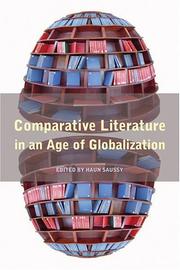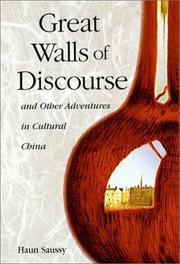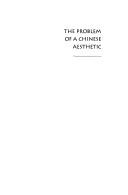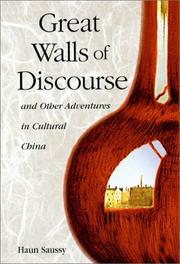| Listing 1 - 10 of 30 | << page >> |
Sort by
|

ISBN: 0801883792 0801883806 9780801883804 9780801883798 Year: 2006 Publisher: Baltimore, Md The Johns Hopkins University Press
Abstract | Keywords | Export | Availability | Bookmark
 Loading...
Loading...Choose an application
- Reference Manager
- EndNote
- RefWorks (Direct export to RefWorks)
As an academic discipline built upon Enlightenment thought and a cosmopolitan worldview -- not grounded in the literary tradition of any single language or nation -- comparative literature has benefited from regular reexamination of its basic principles and practices. The American Comparative Literature Association 1993 report on the state of the discipline, prepared under the leadership of Charles Bernheimer, focused on the influence of multiculturalism as a concept transforming literary and cultural studies. That report and the vigorous responses it generated, published together as & Comparative Literature in the Age of Multiculturalism&, offered a comprehensive survey of comparative criticism in the 1990s. In the first decade of the twenty-first century, globalization has emerged as a defining paradigm in nearly every area of human activity. This latest report from the ACLA demonstrates that comparative critical strategies today can provide unique insights into the world's changing -- and, increasingly, colliding -- cultures. Incorporating an even wider range of voices than had its predecessor, the report examines how the condition (or myth) of globalization, in all its modes and moods, affirms or undercuts the intuitions of comparative literature; how world literatures, whether seen as utopian project or as classroom practice, intersect with the canons and interpretive styles of national literatures; and how material conditions of practice such as language, media, history, gender, and culture appear under the conditions of the present moment. Responding to the frequent attacks against contemporary literary studies, & Comparative Literature in an Age of Globalization& establishes the continuing vitality of the discipline and its rigorous intellectual engagement with the issues facing today's global society. Contributors: Emily Apter, Christopher Braider, Marshall Brown, Jonathan Culler, David Damrosch, Caroline Eckhardt, Caryl Emerson, David Ferris, Gail Finn

ISBN: 0674008596 067400860X 1684173728 Year: 2001 Volume: 212 Publisher: Cambridge (Mass.): Harvard university Asia center
Abstract | Keywords | Export | Availability | Bookmark
 Loading...
Loading...Choose an application
- Reference Manager
- EndNote
- RefWorks (Direct export to RefWorks)
China --- Chine --- Civilization --- Social life and customs --- Historiography --- Civilisation --- Moeurs et coutumes --- Historiographie --- S02/0300 --- S02/0310 --- China: General works--Chinese culture and the West and vice-versa --- China: General works--Intercultural dialogue --- Civilization. --- Historiography. --- History.
Book
ISBN: 9780198812531 0198812531 Year: 2017 Publisher: Oxford Oxford University Press
Abstract | Keywords | Export | Availability | Bookmark
 Loading...
Loading...Choose an application
- Reference Manager
- EndNote
- RefWorks (Direct export to RefWorks)
This volume examines translation from many different angles: it explores how translations change the languages in which they occur, how works introduced from other languages become part of the consciousness of native speakers, and what strategies translators must use to secure acceptance for foreign works. Haun Saussy argues that translation doesn't amount to the composition, in one language, of statements equivalent to statements previously made in another language. Rather, translation works with elements of the language and culture in which it arrives, often reconfiguring them irreversibly: it creates, with a fine disregard for precedent, loan-words, calques, forced metaphors, forged pasts, imaginary relationships, and dialogues of the dead. Creativity, in this form of writing, usually considered merely reproductive, is the subject of this book.
Translating and interpreting --- S12/0600 --- S15/1200 --- Interpretation and translation --- Interpreting and translating --- Language and languages --- Literature --- Translation and interpretation --- Translators --- China: Philosophy and Classics--Zhuangzi --- China: Language--Aspects of translation from and to Chinese --- Translating --- Translation science --- Zhuangzi, Nan Hua Jing --- Zhuang Zhou --- Translating and interpreting. --- Zhuang, Zhou --- China. --- History --- Zhuangzi.
Book
ISBN: 9780691231969 0691231966 Year: 2022 Publisher: Princeton Princeton University Press
Abstract | Keywords | Export | Availability | Bookmark
 Loading...
Loading...Choose an application
- Reference Manager
- EndNote
- RefWorks (Direct export to RefWorks)
A groundbreaking account of translation and identity in the Chinese literary tradition before 1850—with important ramifications for today. Debates on the canon, multiculturalism, and world literature often take Eurocentrism as the target of their critique. But literature is a universe with many centers, and one of them is China. The Making of Barbarians offers an account of world literature in which China, as center, produces its own margins. Here Sinologist and comparatist Haun Saussy investigates the meanings of literary translation, adaptation, and appropriation on the boundaries of China long before it came into sustained contact with the W est.When scholars talk about comparative literature in Asia, they tend to focus on translation between European languages and Chinese, Korean, and Japanese, as practiced since about 1900. In contrast, Saussy focuses on the period before 1850, when the translation of foreign works into Chinese was rare because Chinese literary tradition overshadowed those around it.The Making of Barbarians looks closely at literary works that were translated into Chinese from foreign languages or resulted from contact with alien peoples. The book explores why translation was such an undervalued practice in premodern China, and how this vast and prestigious culture dealt with those outside it before a new group of foreigners—Europeans—appeared on the horizon.
Book
ISBN: 0804725934 Year: 1995 Publisher: Stanford (Calif.) : Stanford university press,
Abstract | Keywords | Export | Availability | Bookmark
 Loading...
Loading...Choose an application
- Reference Manager
- EndNote
- RefWorks (Direct export to RefWorks)

ISBN: 0804720746 Year: 1993 Publisher: Stanford (Calif.): Stanford university press
Abstract | Keywords | Export | Availability | Bookmark
 Loading...
Loading...Choose an application
- Reference Manager
- EndNote
- RefWorks (Direct export to RefWorks)
Chinese literature --- Literature --- History and criticism --- Aesthetics
Book
Year: 1997 Publisher: Philadelphia (Pa.): University of Pennsylvania. Department of Asian and Middle Eastern studies
Abstract | Keywords | Export | Availability | Bookmark
 Loading...
Loading...Choose an application
- Reference Manager
- EndNote
- RefWorks (Direct export to RefWorks)

ISBN: 9781684173723 9780674008601 Year: 2001 Publisher: Boston : Leiden; Boston : Harvard University Asia Center BRILL
Abstract | Keywords | Export | Availability | Bookmark
 Loading...
Loading...Choose an application
- Reference Manager
- EndNote
- RefWorks (Direct export to RefWorks)
Civilization --- China --- Civilization. --- Historiography.
Book
ISBN: 9780520257115 9780520257139 0520257111 0520257138 9786612531781 0520945638 1282531786 9780520945630 Year: 2010 Volume: 23 Publisher: Berkeley University of California Press
Abstract | Keywords | Export | Availability | Bookmark
 Loading...
Loading...Choose an application
- Reference Manager
- EndNote
- RefWorks (Direct export to RefWorks)
For nearly thirty years, anthropologist and physician Paul Farmer has traveled to some of the most impoverished places on earth to bring comfort and the best possible medical care to the poorest of the poor. Driven by his stated intent to "make human rights substantial," Farmer has treated patients-and worked to address the root causes of their disease-in Haiti, Boston, Peru, Rwanda, and elsewhere in the developing world. In 1987, with several colleagues, he founded Partners In Health to provide a preferential option for the poor in health care. Throughout his career, Farmer has written eloquently and extensively on these efforts. Partner to the Poor collects his writings from 1988 to 2009 on anthropology, epidemiology, health care for the global poor, and international public health policy, providing a broad overview of his work. It illuminates the depth and impact of Farmer's contributions and demonstrates how, over time, this unassuming and dedicated doctor has fundamentally changed the way we think about health, international aid, and social justice. A portion of the proceeds from the sale of this book will be donated to Partners In Health.
Epidemiology. --- Internationality --- Medical anthropology. --- Physician's Role --- Poor --- Poverty --- Public health. --- Social Justice --- Social Medicine --- Social medicine. --- Medical care. --- Hygiene. Public health. Protection --- Farmer, Paul --- Medical anthropology --- Social medicine --- Epidemiology --- Public health --- Medical care --- #SBIB:39A9 --- #SBIB:316.334.3M20 --- #SBIB:316.334.3M50 --- #SBIB:327.7H44 --- Common Good --- Justice --- Obligations of Society --- Good, Common --- Justice, Social --- Physicians' Role --- Physician Role --- Physician's Roles --- Physicians Role --- Physicians' Roles --- Role, Physician's --- Role, Physicians' --- Roles, Physician's --- Roles, Physicians' --- Globalization --- International Aspects --- International Perspectives --- International Relations --- Multinational Aspects --- Multinational Perspectives --- Aspect, International --- Aspect, Multinational --- Aspects, International --- Aspects, Multinational --- International Aspect --- International Perspective --- Multinational Aspect --- Multinational Perspective --- Perspective, International --- Perspective, Multinational --- Perspectives, International --- Perspectives, Multinational --- Relations, International --- International Law --- Medicine, Social --- Public Health --- Indigents --- Low Income Population --- Indigency --- Low-Income Population --- Indigent --- Low Income Populations --- Low-Income Populations --- Population, Low Income --- Population, Low-Income --- Populations, Low Income --- Populations, Low-Income --- Working Poor --- Community health --- Health services --- Hygiene, Public --- Hygiene, Social --- Public health services --- Public hygiene --- Sanitary affairs --- Social hygiene --- Health --- Human services --- Biosecurity --- Health literacy --- Medicine, Preventive --- National health services --- Sanitation --- Diseases --- Medical sociology --- Medicine --- Public welfare --- Sociology --- Medical ethics --- Medical sociologists --- Anthropology --- Charities, Medical --- Medische antropologie / gezondheid / handicaps --- Sociale epidemiologie en etiologie: sociale aspecten van ziekte en gezondheid --- Organisatie van de gezondheidszorg: algemeen, beleid --- Specifieke internationale organisaties en samenwerking: gezondheid --- Social aspects --- Anthropological aspects --- Health and hygiene --- Absolute Poverty --- Extreme Poverty --- Poverty, Absolute --- Poverty, Extreme --- Internationality -- Personal Narratives. --- Poor -- Medical care. --- Poverty -- Personal Narratives. --- Social Medicine -- Personal Narratives. --- Socioeconomic Factors --- Principle-Based Ethics --- Professional Role --- Human Rights --- Social Problems --- Social Sciences --- Social Control, Formal --- Ethics --- Anthropology, Education, Sociology and Social Phenomena --- Population Characteristics --- Role --- Health Occupations --- Disciplines and Occupations --- Philosophy --- Health Care Economics and Organizations --- Humanities --- Group Processes --- Health Care --- Psychology, Social --- Behavior and Behavior Mechanisms --- Psychiatry and Psychology --- Health & Biological Sciences --- Psychology, Perceptual --- Social Psychology --- Perceptual Psychology --- Community-Based Distribution --- Contraceptive Distribution --- Delivery of Healthcare --- Dental Care Delivery --- Distribution, Non-Clinical --- Distribution, Nonclinical --- Distributional Activities --- Healthcare --- Healthcare Delivery --- Healthcare Systems --- Non-Clinical Distribution --- Nonclinical Distribution --- Delivery of Dental Care --- Health Care Delivery --- Health Care Systems --- Activities, Distributional --- Activity, Distributional --- Care, Health --- Community Based Distribution --- Community-Based Distributions --- Contraceptive Distributions --- Deliveries, Healthcare --- Delivery, Dental Care --- Delivery, Health Care --- Delivery, Healthcare --- Distribution, Community-Based --- Distribution, Contraceptive --- Distribution, Non Clinical --- Distributional Activity --- Distributions, Community-Based --- Distributions, Contraceptive --- Distributions, Non-Clinical --- Distributions, Nonclinical --- Health Care System --- Healthcare Deliveries --- Healthcare System --- Non Clinical Distribution --- Non-Clinical Distributions --- Nonclinical Distributions --- System, Health Care --- System, Healthcare --- Systems, Health Care --- Systems, Healthcare --- Group Meetings --- Group Process --- Group Thinking --- Group Meeting --- Group Thinkings --- Meeting, Group --- Meetings, Group --- Process, Group --- Processes, Group --- Thinking, Group --- Thinkings, Group --- Healthcare Economics and Organizations --- Pharmacy Philosophy --- Philosophical Overview --- Hedonism --- Stoicism --- Overview, Philosophical --- Overviews, Philosophical --- Pharmacy Philosophies --- Philosophical Overviews --- Philosophies --- Philosophies, Pharmacy --- Philosophy, Pharmacy --- Health Professions --- Health Occupation --- Health Profession --- Profession, Health --- Professions, Health --- Occupations --- Role Concept --- Concept, Role --- Concepts, Role --- Role Concepts --- Roles --- General Social Development and Population --- Population Heterogeneity --- Population Statistics --- Characteristic, Population --- Characteristics, Population --- Heterogeneity, Population --- Population Characteristic --- Statistics, Population --- Egoism --- Ethical Issues --- Metaethics --- Moral Policy --- Natural Law --- Situational Ethics --- Ethical Issue --- Ethics, Situational --- Issue, Ethical --- Issues, Ethical --- Law, Natural --- Laws, Natural --- Moral Policies --- Natural Laws --- Policies, Moral --- Policy, Moral --- Censorship, Research --- Regulation --- Social Control --- Control, Social --- Controls, Social --- Formal Social Control --- Formal Social Controls --- Regulations --- Social Controls --- Public Policy --- Labor Exploitation --- Social Exploitation --- Exploitation, Labor --- Exploitation, Social --- Exploitations, Labor --- Problem, Social --- Problems, Social --- Social Problem --- Medical Specialities --- Medical Specialties --- Medical Specialty --- Specialities, Medical --- Specialties, Medical --- Specialty, Medical --- Medical Speciality --- Speciality, Medical --- Health Workforce --- Science, Social --- Sciences, Social --- Social Science --- Collective Human Rights --- Equal Rights --- Linguistic Rights --- Right to Housing and Shelter --- Rights of Indigenous Peoples --- Human Rights, Collective --- Indigenous Peoples Rights --- Rights, Collective Human --- Rights, Equal --- Rights, Linguistic --- Human Rights Abuses --- Professional Roles --- Role, Professional --- Roles, Professional --- Principlism --- Ethic, Principle-Based --- Ethics, Principle-Based --- Principle Based Ethics --- Principle-Based Ethic --- Ethical Theory --- Factors, Socioeconomic --- High-Income Population --- Inequalities --- Land Tenure --- Standard of Living --- Factor, Socioeconomic --- High Income Population --- High-Income Populations --- Inequality --- Living Standard --- Living Standards --- Population, High-Income --- Populations, High-Income --- Socioeconomic Factor --- Tenure, Land --- Economics --- Behavior And Behavior Mechanism --- Health Care Economics --- Health Economics --- Healthcare Economics --- Care Economic, Health --- Economic, Health --- Economic, Health Care --- Economic, Healthcare --- Economics, Health Care --- Health Care Economic --- Health Economic --- Healthcare Economic --- Social Inequalities --- Social Inequality --- Inequalities, Social --- Inequality, Social --- Federal Poverty Threshold --- Poverty Threshold, Federal --- Poverty Thresholds, Federal --- Thresholds, Federal Poverty --- Federal Poverty Level --- Federal Poverty Levels --- Level, Federal Poverty --- Poverty Level, Federal --- Poor - Medical care --- Poverty - Personal Narratives --- Social Medicine - Personal Narratives --- Internationality - personal narratives --- Physician's Role - Personal Narratives --- Social Justice - Personal Narratives --- anthropologists. --- boston. --- developing world. --- disease. --- epidemiology. --- global poor. --- haiti. --- health care. --- human condition. --- human rights. --- humanitarian. --- impoverished peoples. --- international aid. --- international policy. --- medical anthropology. --- medical care. --- medical professionals. --- medicine. --- nonfiction. --- partners in health. --- patient care. --- paul farmer. --- peru. --- physicians. --- politics. --- poor patients. --- poverty. --- rwanda. --- science medicine healthcare. --- social justice.
Book
ISBN: 9780823270460 0823270467 9780823270477 0823270475 0823270513 0823270505 0823270491 9780823270514 9780823270491 9780823270507 Year: 2016 Publisher: New York, NY
Abstract | Keywords | Export | Availability | Bookmark
 Loading...
Loading...Choose an application
- Reference Manager
- EndNote
- RefWorks (Direct export to RefWorks)
"Winner of the Modern Language Association's Aldo and Jeanne Scaglione Prize for Comparative Literary Studies. Who speaks? The author as producer, the contingency of the text, intertextuality, the “device”—core ideas of modern literary theory—were all pioneered in the shadow of oral literature. Authorless, loosely dated, and variable, oral texts have always posed a challenge to critical interpretation. When it began to be thought that culturally significant texts—starting with Homer and the Bible—had emerged from an oral tradition, assumptions on how to read these texts were greatly perturbed. Through readings that range from ancient Greece, Rome, and China to the Cold War imaginary, The Ethnography of Rhythm situates the study of oral traditions in the contentious space of nineteenth- and twentieth-century thinking about language, mind, and culture. It also demonstrates the role of technologies in framing this category of poetic creation. By making possible a new understanding of Maussian “techniques of the body” as belonging to the domain of Derridean “arche-writing,” Haun Saussy shows how oral tradition is a means of inscription in its own right, rather than an antecedent made obsolete by the written word or other media and data-storage devices."--Provided by publisher.
Epik. --- Folk literature --- Folk literature. --- Folkdiktning. --- LITERARY CRITICISM --- Muntlig tradition. --- Muntligt berättande. --- Mündliche Literatur. --- Mündliche Überlieferung. --- Oral tradition. --- Orality in literature. --- Poetics. --- Poetik. --- SOCIAL SCIENCE --- Storytelling. --- TECHNOLOGY & ENGINEERING --- History and criticism. --- Semiotics & Theory. --- Anthropology --- Cultural. --- Social Aspects. --- Derrida. --- Homer. --- Jacques. --- MacLuhan. --- Marshall. --- Milman. --- Parry. --- embodiment. --- literacy. --- media. --- memory. --- oral tradition. --- theory of literature. --- Tradition, Oral --- Oral communication --- Folklore --- Oral history --- Poetry --- Story-telling --- Telling of stories --- Oral interpretation --- Children's stories --- Oral interpretation of fiction --- Technique --- Performance --- History and criticism
| Listing 1 - 10 of 30 | << page >> |
Sort by
|

 Search
Search Feedback
Feedback About UniCat
About UniCat  Help
Help News
News